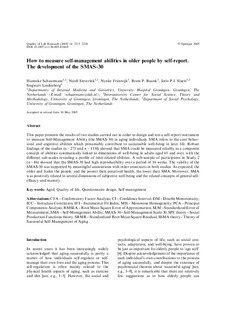How to Measure Self-management Abilities in Older People by Self-report. The Development of the SMAS-30
Journal article

Åpne
Permanent lenke
http://hdl.handle.net/11250/2478093Utgivelsesdato
2005Metadata
Vis full innførselSamlinger
Originalversjon
Schuurmans, H., Steverink, N., Frieswijk, N., Buunk, B., Slaets, J. & Lindenberg, S. (2005) How to Measure Self-management Abilities in Older People by Self-report. The Development of the SMAS-30. An International Journal of Quality of Life Aspects of Treatment, Care and Rehabilitation - Official Journal of the International Society of Quality of Life Res, 14(10), 2215-2228. https://doi.org/10.1007/s11136-005-8166-9Sammendrag
This paper presents the results of two studies carried out in order to design and test a self-report instrument to measure Self-Management Ability (the SMAS-30) in aging individuals. SMA refers to the core behavioral and cognitive abilities which presumably contribute to sustainable well-being in later life. Robust findings of the studies (n=275 and n=1338) showed that SMA could be measured reliably as a composite concept of abilities systematically linked to dimensions of well-being in adults aged 65 and over, with the different sub-scales revealing a profile of inter-related abilities. A sub-sample of participants in Study 2 (n=86) showed that the SMAS-30 had high reproducibility over a period of 16 weeks. The validity of the SMAS-30 was supported by meaningful associations with other constructs in both studies. As expected, the older and frailer the people, and the poorer their perceived health, the lower their SMA. Moreover, SMA was positively related to several dimensions of subjective well-being and the related concepts of general self-efficacy and mastery.